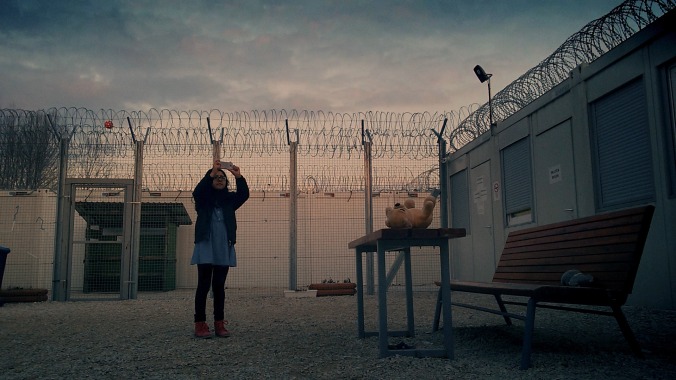A filmmaking family is forced into exile in the tense Sundance winner Midnight Traveler


Over the past few years, the plight of political refugees has been a divisive social issue in nations around the globe, with some of our more nationalist, rabble-rousing leaders downplaying the complicated circumstances that force families to flee their homelands, and instead suggesting that anyone moving from a war-torn nation to a more stable one must be inherently undesirable. If nothing else, Hassan Fazili’s documentary, Midnight Traveler, offers a necessary corrective to the widely held contention that refugees have nothing to offer to the countries where they land. Fazili brings some personal stakes to the situation, by tracking one likable and clearly capable family from Afghanistan to Germany.
The family is his own. After the filmmaker enraged the Taliban with his clear-eyed assessments of life in Afghanistan, he was forced to hit the road in 2015 with his wife, Fatima Hussaini (a director herself, and a TV actor), and their two preteen daughters, Nargis and Zahra. Armed with smartphones, the four documented their journey through Turkey, Bulgaria, and Serbia, taking time throughout the long, grueling trip—lasting well over a year—to film the squalid conditions in refugee camps, and to comment on the labyrinthine processes through which migrants are allowed to stay in their host countries.
Midnight Traveler is anecdotal by design. Fazili’s primary concerns are the welfare of his wife and kids, with whom he’s obviously enamored. There’s not a lot in this movie about the specifics of their difficult trek across Europe, which involved sleeping outdoors sometimes and eluding the local authorities. But Fazili—alongside his producer-editor, Emelie Mahdavian, who shaped the footage snuck out to her over the years—does include a scene where the director and Hussaini playfully banter about him flirting with a fellow refugee, and they feature multiple scenes where Nargis and Zahra evaluate their refugee experience in terms of the quality of nearby playgrounds and whether they’re eaten by insects at night. It’s hard not to be charmed when Nargis surveys the bunks in their Bulgarian camp and marvels, “This bed has a roof.”
The movie suffers some from the method of its creation. Fazili and Mahdavian are constrained by the footage they have, which means some crucial pieces of this story are missing. The audience is told little to nothing about the family’s pre-fugitive life in Afghanistan. What was their home and daily routine like? What meaning do Hussaini and her daughters ascribe to their headscarves, given that—as is mentioned in passing during a conversation between husband and wife—they’re not especially religious? What do and don’t they have in common with their fellow refugees, very few of whom appear on camera?
Fazili also falls short when he attempts to go meta, talking about how the process of making a movie about his plight distances him from the reality of it. When one of his girls goes missing for a few hours, Fazili mentions in his voice-over narration that he couldn’t help thinking about how this potential tragedy could make his film more dramatic. The honesty is appreciated, but this is another case in Midnight Traveler where the uniqueness of Fazili’s position as an accomplished artist and journalist makes his account of the refugee experience less universal.
On the other hand, his life is his life—not much he can do about that. And the overall point of Midnight Traveler remains strong. This isn’t a movie about “refugees” as an abstract concept, or as a political talking point. It’s a film about four smart, funny, loving, and talented people who’ve been driven from their home. They would make anywhere they end up a better place.